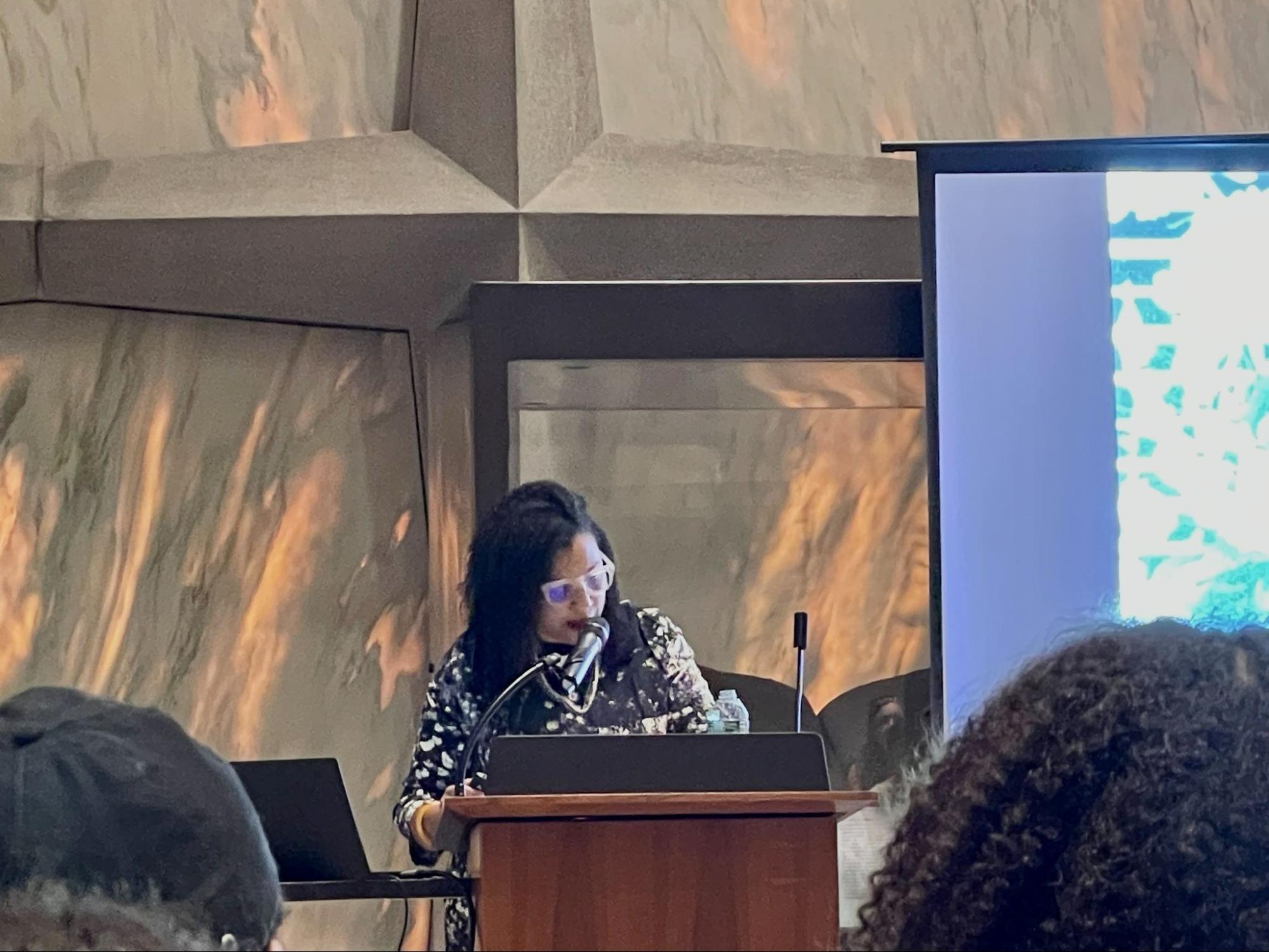National Book Award winner speaks at Beinecke
Robin Coste Lewis discussed her poetry and ancestry in a recent lecture hosted by the Department of African American Studies at the Beinecke Rare Book and Manuscript Library last week.

Kinnia Cheuk, Contributing Photographer
Robin Coste Lewis — who received a National Book Award for her poetry collection, “Voyage of the Sable Venus” — delivered the annual James Weldon Johnson Memorial Lecture last Tuesday, hosted jointly by the Beinecke Rare Book and Manuscript Library and the Department of African American Studies.
Lewis first spoke about her experiences with memory, culture and African American relationships through the lens of her family. She then showed a moving-image film titled “Intimacy,” consisting of photographs from her grandmother’s photo archive, accompanied by a live voice-over of Lewis reading her new poem, “Intimacy (for Julie) Part 2.”
“What Lewis offers us in her breathtaking works and prose is an opportunity to consider our likeness in our own time,” said Erica Edwards, a professor of African American studies. “A time of catastrophic declensions and tremendous heights and arcs to consider our own time as a small capsule in the time of the Earth — the thousands and thousands of billions of years that preceded us.”
The event started with an introduction by Edwards, who placed Lewis’ work in the context of what she called the current “re-re-rebirth of African American letters, especially Black women’s literature and art.”
In her speech and her spoken poetry, Lewis traced the origin of the film and her exploration of memory to her late grandmother’s photo archive. She only discovered the archive after her grandmother had passed away from Alzheimer’s disease.
The photographs on the screen situated the audience within her grandmother’s specific community of the Black diaspora from Louisiana in Los Angeles. Lewis’ lecture expanded on the topic, covering history and migration.
Lewis said that she feels her dead ancestors are “alive, present, palpable, standing nearby [and] listening.” Her poetry expresses how every “newborn face,” “eyebrow shape,” and “the color of the eye,” was “an ancestor’s artifact” — either a return or a farewell, she said.
The lecture showcased a variety of ways in which memory can be preserved. By giving voice to the past through words, Lewis infused her grandmother’s photographs with her own meditations on the way that relationships last through generations.
Even though Lewis said her poetry is informed by her identity as an African American woman, she said that the emotions she writes about are universal. A significant portion of her poetry lacks a specific setting and the use of “I” and “you” pronouns.
Attendee Ruthie Block GRD ’29 highlighted their fascination with Lewis’ intentional decision to produce the moving-image film without subtitles.
“I found it very striking when she talked about her ‘refusal to caption’ her work,” Block said. “She turned the traditional relationship between the textual and visual on their heads and allowed for the photographs to illustrate the poetry, rather than having the relationship flow in the other direction.”
The Department of African American Studies hosted a discussion on Lewis’s work a week before the lecture as part of the “Endeavors Seminar Series,” focusing on her National Book Award-winning collection “Voyage of the Sable Venus.”
Block said that the discussion helped them contextualize film, “Intimacy” in Lewis’s wider work.
“Getting to be in conversation with those two books was really beautiful and reflecting on the way that her work has changed,” Block said. “That helped set us up to be present in a unique way for what she offered the other night.”
Tyler Campbell GRD ’29 said that the lecture was “a very special moment” to him, especially given his interest in the intersection between creative writing and personal documentation.
The way that Lewis incorporates the visual archive into her family genealogy has influenced Campbell’s personal projects, he said. He is currently working on a poetry collection which consists of interviews conducted with people from his neighborhood, focusing on ideas of kinship and survival.
“[My project] uses a lot of visual components as well, in a similar manner,” he said. “So hearing her talk about the project and the construction of the book was inspiring to my own process.”
“Intimacy” was also presented at the Marian Goodman Gallery in New York over the summer.







